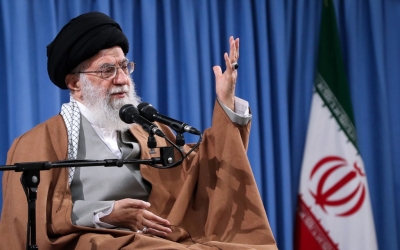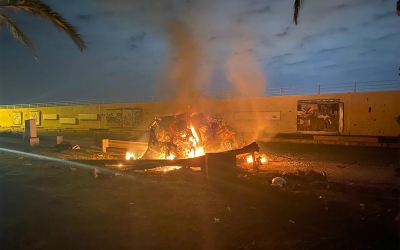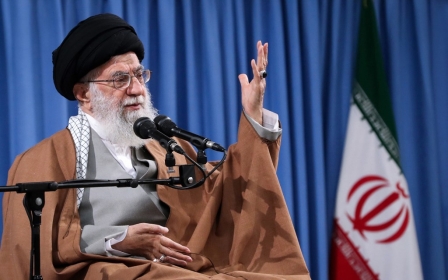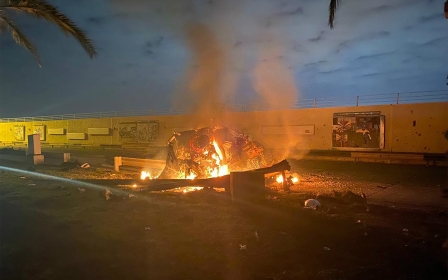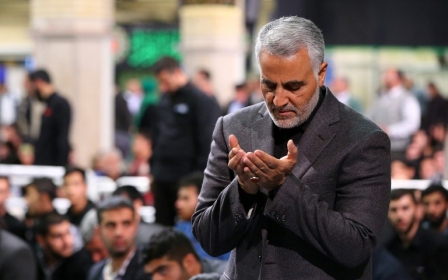'Criminal American aggression': International reaction to the killing of Qassem Soleimani
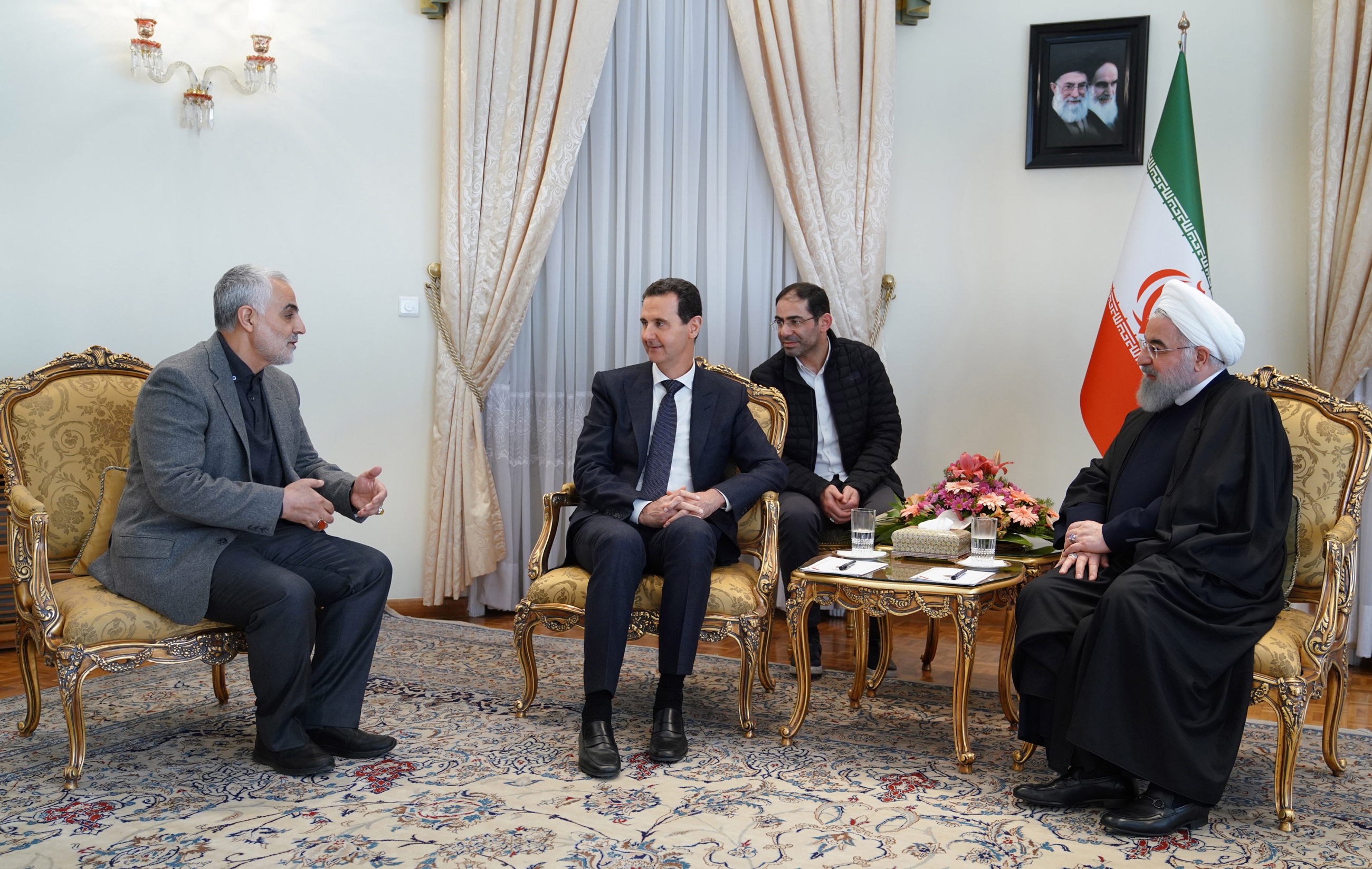
Countries in the Middle East and around the world have been reacting to the killing on Friday morning of Iran's top general Qassem Soleimani in a US strike on Baghdad's international airport.
The 62-year-old led Iran's military operations in the region as head of Iran's elite Quds Force.
The killing marked a dramatic escalation in tensions between Washington and Tehran, with major repercussions expected for the region.
Here is how countries around the world have reacted to the killing.
United States
New MEE newsletter: Jerusalem Dispatch
Sign up to get the latest insights and analysis on Israel-Palestine, alongside Turkey Unpacked and other MEE newsletters
The Pentagon confirmed its forces had killed Soleimani, saying in a statement that the strike, which had been carried out "at the direction of the president", was "aimed at deterring future Iranian attack plans".
Soon after the news broke, US President Donald Trump posted a cryptic tweet of an American flag without any comment.
US Secretary of State Mike Pompeo posted a video of Iraqis cheering in the streets, commenting: "Iraqis - Iraqis - dancing in the street for freedom; thankful that General Soleimani is no more."
Nancy Pelosi, speaker of the US House of Representatives, said: "Tonight’s air strike risks provoking a further dangerous escalation of violence.
"America - and the world - cannot afford to have tensions escalate to the point of no return.
"The administration has conducted tonight's strikes in Iraq without an Authorisation for Use of Military Force (AUMF) against Iran. Further, this action was taken without the consultation of Congress."
Former US Vice President Joe Biden accused Trump of throwing "a stick of dynamite into a tinderbox."
"He owes the American people an explanation of the strategy and plan to keep safe our troops and embassy personnel, our people and our interests, both here at home and abroad, and our partners throughout the region and beyond."
Meanwhile, US Senator and Democratic presidential contender Elizabeth Warren said while "Soleimani was a murderer," the decision to kill the general increased "the likelihood of more deaths" and a "new Middle East conflict."
"Soleimani was a murderer, responsible for the deaths of thousands, including hundreds of Americans. But this reckless move escalates the situation with Iran and increases the likelihood of more deaths and new Middle East conflict. Our priority must be to avoid another costly war."
Iran
Iran's Supreme Leader Ali Khamenei warned that "severe revenge" awaits the killers of Soleimani, while Foreign Minister Mohammad Javad Zarif called the assassination an "act of international terrorism".
"The US' act of international terrorism, targeting & assassinating General Soleimani-THE most effective force fighting Daesh (ISIS), Al Nusrah, Al Qaeda et al-is extremely dangerous & a foolish escalation," Zarif said.
"The US bears responsibility for all consequences of its rogue adventurism."
Iranian President Hassan Rouhani said: "Soleimani's martyrdom will make Iran more decisive to resist America's expansionism and to defend our Islamic values," Rouhani said in a statement.
"With no doubt, Iran and other freedom-seeking countries in the region will take his revenge."
Syria
Syria strongly condemned the "treacherous, criminal American aggression" that led to the killing of Soleimani, state news agency Sana cited a foreign ministry source as saying on Friday.
The source said that the attack constituted a "serious escalation" and reaffirmed US responsibility for instability in Iraq, according to Sana
Iraq
Iraqi Prime Minister Adel Abdul-Mahdi said in a statement that the air strike was an act of aggression on Iraq and a breach of its sovereignty that will lead to war in Iraq, the region and the world.
The strike also violated the conditions of the US's military presence in Iraq and should be met with legislation that safeguarded Iraq's security and sovereignty, Abdul-Mahdi added.
He called on parliament to convene in an extraordinary session.
Iraq's militia-leader-turned-populist-politician Muqtada al-Sadr reactivated his Mahdi Army on Friday following the US strike.
Taking to Twitter, Sadr ordered "fighters, particularly those from the Mahdi Army, to be ready" following the strike, reviving the anti-American force nearly a decade after he dissolved it.
Israel
Israel's defence minister summoned the country's military and security chiefs to Tel Aviv on Friday in the wake of Soleimani's killing.
Israel Army Radio said the military had gone on heightened alert, amid fears that Iran could strike through its regional allies such as Tehran-backed Lebanese movement Hezbollah to the north, or through Hamas and Islamic Jihad in Gaza.
"They will wait for the right moment to exact revenge, perhaps by firing into Israeli territory through Shia militias in Syria and perhaps even from Gaza," Ron Ben-Yishai, writing for Israeli news outlet Ynet, wrote on its website.
Israeli media commentators said that ministers in Benjamin Netanyahu's rightwing coalition government had been asked not to comment publicly on Soleimani's killing.
"The goal is clear: not to unnecessarily complicate Israel and keep the message as unified as possible," said Dana Weiss, chief political analyst for Israel's Channel 12 news.
But Yair Lapid, an opposition lawmaker, congratulated US President Donald Trump on Twitter for killing those responsible for "murderous terrorist acts from Damascus to Buenos Aires" and that Soleimani's "blood is forfeit".
The UAE
The United Arab Emirates, a key American ally in the region, did not publicly cheer for Qassem Soleimani's death, despite its longstanding animosity with Tehran.
On the contrary, the UAE's minister of state for foreign affairs Anwar Gargash called for a "calm approach" to the crisis, decrying the lack of trust between the parties involved in the region.
"In light of the fast-evolving regional developments, it is a must to advance wisdom and prioritize political solutions to confrontation and escalation," he wrote on Twitter in Arabic on Friday.
"The issues that the region faces are complicated and accumulated, suffering from the lack of trust between the parties involved. Rational action requires a calm approach, free of emotional reactions."
Occupied Palestinian territories
In Gaza, Hamas - which has long enjoyed financial and military support from Tehran - condemned Soleimani's killing and sent its "dearest condolences" to Iran.
Hamas said Soleimani "had a senior role in supporting Palestinian resistance in all fields".
It extended "its dearest condolences to the Iranian leadership and the people of Iran at the martyrdom of Major General Qassem Soleimani".
Gaza-based Hamas official Basem Naim wrote on Twitter that the assassination "opens the doors of the region to all possibilities, except calm & stability. USA bears the responsibility for that”.
The Palestinian militant group Islamic Jihad, also based in Gaza, praised Soleimani as a leader "who always brought horror into the hearts of America and Israel".
"The alliance of resistance will not be defeated, will not be broken and its integrity will become stronger in confronting the Zionist-American project," Abu Hamza, a spokesman for Islamic Jihad, said on Twitter.
Lebanon
Lebanon's foreign ministry on Friday called for the country and wider region to be spared any repercussions from the death of Soleimani.
The ministry also condemned the killing, calling it a violation of Iraqi sovereignty and a dangerous escalation against Iran.
Hezbollah leader Sayyed Hassan Nasrallah said his powerful Lebanese movement would continue the path of Soleimani following his death, broadcaster Al Manar said.
Nasrallah said the United States would not be able to achieve its goals with this "big crime" and just punishment was the responsibility of all fighters.
Yemen
Yemen's pro-Tehran rebel Houthis, who control the capital Sanaa, called on Friday for "swift reprisals" for the killing of Soleimani.
"We condemn this killing and direct and swift reprisals are the answer," senior rebel political official Mohammed Ali al-Houthi tweeted.
The Saudi-led coalition, which has been fighting the rebels since March 2015, accuses Iran of providing them with sophisticated weapons to use against Saudi airports and oil facilities, something Tehran denies.
In September, the Yemeni rebels claimed responsibility for twin drone and missile strikes on Saudi oil facilities that briefly knocked out half the kingdom's output, sending world prices soaring.
The United States dismissed the rebel claim and alleged that it was Iran itself which orchestrated the attacks, something Tehran again denied.
Turkey
Turkey
The Turkish Foriegn Ministry said Ankara is "deeply worried about the escalating tension" between Washington and Tehran in the region.
"We strongly reiterate that turning Iraq into a conflict zone will harm peace and stability not only in Iraq, but also the entire region," the ministry said in a statement on Friday.
It added that the assassination "will obviously further aggravate insecurity and instability in the region".
Escalatory moves harm all the parties involved in the conflict, Ankara said.
Egypt
Egypt's foreign ministry said on Friday it was following developments in Iraq with great concern and appealed against any further escalation.
"The Foreign Ministry is following with great concern accelerating developments in Iraq, which augur an escalation it is important to avoid," the statement said.
"For this reason, Egypt calls for containing the situation and avoiding any escalation."
China
China consistently opposes the use of force in international relations, the country's foreign ministry said on Friday when asked about the killing of Soleimani.
China urges the relevant sides, especially the United States, to remain calm and exercise restraint to avoid further escalating tensions, said Geng Shuang, a ministry spokesman, at a regular press briefing in Beijing, adding that peace and stability in the Middle East must be upheld.
France
"What is happening is what we feared: tensions between the United States and Iran are increasing," French Junior Foreign Affairs Minister Amelie de Montchalin told RTL radio.
"The priority is to stabilise the region."
The minister said that top French officials would make high-level contacts with senior players in the region.
France urged its citizens in Iran to stay away from public gatherings and the Netherlands told Dutch nationals to leave Baghdad.
"Three days of mourning have been declared after the death of General Soleimani. In this context, we recommend French citizens to stay away from any gatherings and to behave with prudence and discretion and abstain from taking pictures in public spaces," France's embassy in Tehran said on Twitter.
Middle East Eye delivers independent and unrivalled coverage and analysis of the Middle East, North Africa and beyond. To learn more about republishing this content and the associated fees, please fill out this form. More about MEE can be found here.


